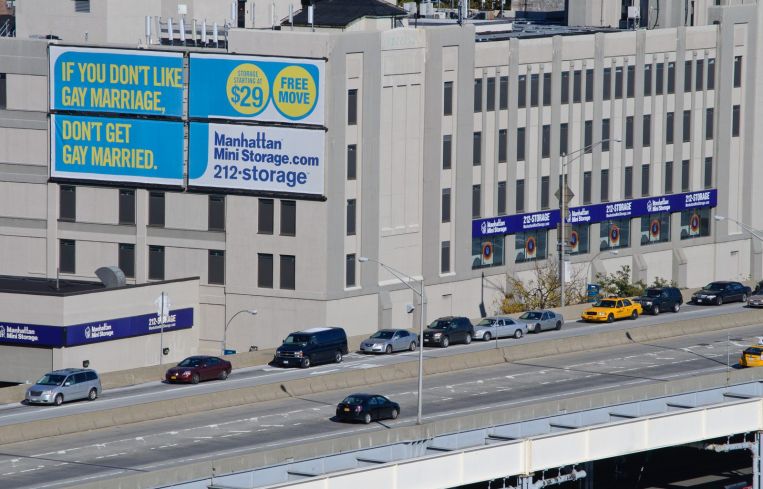Manhattan Mini Storage’s Price Tag Highlights Self-Storage’s Appeal
Investors love the once-niche commercial real estate asset class
By Aaron Short August 19, 2021 11:07 am
reprints
One of the city’s best-known moving companies is hawking their properties for a price that would make the cast of A&E’s “Storage Wars” do a triple take.
Edison Properties, the owner of Manhattan Mini Storage, hired Eastdil Secured to unload 3.1 million square feet of storage space for more than $3 billion, at a time when New Yorkers have increasingly relied on self-storage while living through the pandemic, Bloomberg reported.
The offering and (especially) its asking price also underscore the appeal of self-storage to investors. Once a kind of niche asset class, it’s become increasingly institutionalized and ubiquitous, full of major national players and lots of new product.
“The pandemic has only reinforced the importance and stability of these assets,” Jon Dario, Edison Properties’ chief operating officer, said in a statement earlier this week. “Now, with consumer demand and investor interest in self-storage at an all-time high, we are excited to work with Eastdil Secured to explore a potential sale of Manhattan Mini Storage.”
The New Jersey-based development firm’s garage-like warehouses have become a familiar site to drivers speeding along the FDR Drive and subway commuters avoiding eye contact with fellow passengers. Manhattan Mini Storage’s quirky, yet sardonic, billboards playfully mock its customers with ads like, “If you don’t like gay marriage, don’t get married,” and, “Oh yeah, you’ll fit right in in Connecticut.”
The ads caught on, and more than 150,000 New Yorkers each year dump their excess furniture and tchotchkes in the company’s 56,000 units in 18 storage facilities across Manhattan.
“They have a very visible presence, have done a good job with their brand, and they have the advantage of being in these neighborhoods,” one competitor in the storage industry said. “Even if you’re not storing anything, everyone who has driven down the highway is aware of these guys, and when that time comes and you need storage, it’s the brand you look at first.”
But COVID-19 is no laughing matter. The storage business stalled when the state imposed a shutdown last spring, but began to boom as New Yorkers needed a place to stash their stuff when they temporarily fled town, upgraded apartments, or downsized as work dried up. Some storage companies cut customers a break if they couldn’t pay their bills, but others auctioned off the contents of storage units.
The market continued to heat up as some New Yorkers returned and the city slowly reopened. Investment began to pour into the self-storage industry, too. The New York area was expected to lead the nation with 4.4 million square feet of new self-storage facilities created in 2021, compared with 3 million square feet in 2020. By June, New York had enough projects under construction to equal 17.5 percent of its existing stock, which topped the nation, according to a Yardi Matrix national self-storage report.
“We’re at a historically strong point in the industry,” said Chris Nebenzahl, senior analyst at Yardi Matrix, a data analytics firm that tracks the storage industry. “When you got into COVID, demand shot through the roof for storage. People moved out of their apartments or emptied out their homes to turn an extra bedroom into a home office or a gym. Demand for at-home space during the pandemic changed as people were changing around their living situations.”
Prices changed, too. Before the pandemic, New Yorkers gravitated toward 5-by-5-foot or 5-by-10 units to put extra clothes, bikes, or skis they don’t have room to keep in their apartments. But prices for 10-by-20 units shot up 20 percent and 10-by-30 units jumped 50 percent, while the cost of preferred smaller storage units remained relatively stable, according to Yardi Matrix.
“A lot of the story in Manhattan was outward migration,” Nebenzahl said. “This leads me to believe a lot of people have moved out and they haven’t moved back in or they have moved back in but they haven’t pulled their stuff out of storage.”
New players in the real estate and tech industries flooded the market in recent months, converting empty storefronts, offices, and even a parking garage into a self-storage facility.
Several more established players have sought new investors or gobbled up smaller competitors. Blackstone Group bought Simply Self Storage from Brookfield Asset Management for $1.2 billion in October. Six months later, Public Storage, one of the largest real estate investment trusts in the industry, purchased ezStorage for $1.8 billion.
At $3 billion, Manhattan Mini Storage’s asking price is considerably higher. Competitors estimate the company brings in $180 million to $200 million in revenue, although the sales price almost certainly includes the value of its lucrative Manhattan-based properties. (A spokesman for Edison Properties declined to comment on its revenue or assets.)
“They’re floating it out there, but I can’t imagine it will go for that much, unless there’s another strategic play where someone doesn’t want the business,” the competitor said. “It’s such a weird time to be selling commercial properties in downtown areas, because there’s so much uncertainty in the future of commercial districts.”



